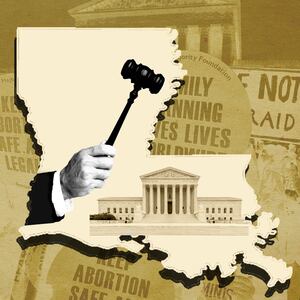The Supreme Court has struck down a Louisiana abortion law that opponents say would have closed all but one abortion clinic in the state and had lasting repercussions for reproductive rights across the country.
The Louisiana law, known as Act 620, would have required abortion providers to have the ability to admit patients at local hospitals. Supporters said the legislation promoted safety and continuity of care; abortion-rights advocates say it was a medically unnecessary restriction would force abortion clinics to shutter because many abortion providers have been denied such privileges.
In a 5-4 decision issued Monday, Justice Stephen Breyer wrote the Louisiana law “offers no significant health benefit” and would “drastically reduce the number and geographic distribution of abortion providers, making it impossible for many women to obtain a safe, legal abortion in the State and imposing substantial obstacles on those who could.”
The decision in June Medical Services v. Russo will have effects far beyond Louisiana. Abortion advocates feared that upholding the law would open the door for other states to pass similar laws and further restrict abortion access without fear of court intervention—effectively gutting the 1973 Roe v. Wade decision that made abortion legal across the country.
Abortion-rights advocates celebrated Monday’s ruling as a win, but cautioned that it would not stop states from passing more restrictive laws in the future.
“We’re relieved that the Louisiana law has been blocked today but we’re concerned about tomorrow,” Nancy Northup, the president and CEO of the Center for Reproductive Rights, which argued on behalf of June Medical Services, said in a statement.
“With this win, the clinics in Louisiana can stay open to serve the one million women of reproductive age in the state," she said. “But the Court’s decision could embolden states to pass even more restrictive laws when clarity is needed if abortion rights are to be protected.”
Admitting privileges—or a physician’s authorization to admit and treat patients at a hospital—are notoriously difficult for abortion providers to secure, both because of the controversy around the procedure and because it rarely requires hospital admission. In Louisiana, a district court found that four of six providers in the state would not be able to obtain such privileges, and a fifth would be restricted to practicing at only two locations. As a result, the court found, two of the state’s three remaining clinics would shutter.
The Louisiana law is nearly identical to a law passed in Texas in 2013 that forced more than half of the state’s abortion clinics to close. Studies showed abortion-seekers in the state were forced to drive farther, spend more money, and wait longer for their abortions in the months that followed. A Supreme Court ruling declared that law unconstitutional in 2014, saying it placed an undue burden on people seeking abortions, but many of the shuttered abortion clinics never reopened their doors.
Attorneys for June Medical Services argued in March that the Louisiana law should be overturned based on the court’s decisions in Texas. Lawyers for the state argued that conditions were different in Louisiana, and that providers had simply not tried hard enough to obtain admitting privileges within 30 miles of hospitals.
Chief Justice John Roberts—a key swing vote in the decision—dissented in Whole Woman’s Health v. Hellerstedt, but sided with the majority Monday in overturning the Louisiana law based on past precedent.
“The question today however is not whether Whole Woman’s Health was right or wrong,” he wrote, “but whether to adhere to it in deciding the present case.”
Roberts and Breyer were joined by Justices Elena Kagan, Ruth Bader Ginsburg, and Sonia Sotomayor in the majority opinion. Justices Samuel Alito and Clarence Thomas, as well as Trump appointees Brett Kavanaugh and Neil Gorsuch, dissented.
The decision was surprising for many who predicted an erosion of reproductive rights under the new, conservative-leaning majority. Since Kavanaugh’s confirmation, anti-abortion groups have been pushing increasingly severe restrictions through state legislatures, in hopes of bringing a case before the Court that could overturn Roe v. Wade.
The Susan B. Anthony List, a right-wing women’s political group, called the ruling a “bitter disappointment” in a tweet Monday, while Live Action President Lila Rose called it “truly awful.”
“Today’s unjust ruling is a reminder that the lives of an entire people group have been wrongly placed in the hands of nine lawyers, several of whom abuse their power to violate the human right to life,” Rose tweeted.
Abortion-rights advocates, meanwhile, seemed to find little solace in their victory. States have passed nearly 500 restrictions on abortion since 2011, according to the Guttmacher Institute, and reproductive-rights groups warned that this decision would not stop them from passing more.
In a statement, Planned Parenthood noted that there are still 16 abortion cases one step away from the Supreme Court—any of which could present an opportunity to nullify Roe.
“While today is a victory for Louisianans, we must remember that we are in a world where politicians have pushed basic health care almost out of reach for millions of Americans, and where your ability to access abortion is still determined by where you live, how much money you make, and in this country that effectively also means the color of your skin,” Planned Parenthood President Alexis McGill Johnson said.
Studies have shown that abortion restrictions disproportionately affect women of color and low-income women, for whom the cost of traveling to a more distant clinic may be insurmountable. As many as 90 percent of June Medical Center’s patients have incomes under the federal poverty level and few have medical insurance to cover the procedure, the clinic’s administrators have testified.
Despite Monday’s ruling, many advocates said, abortion still remains out of reach for many people across the country.
“The Louisiana law is gone, but [other] restrictions remain,” said Kimberly Inez McGuire, executive director of URGE: Unite for Reproductive & Gender Equity. “Though abortion is still legal in this country, it is inaccessible to far too many. We cannot stop fighting until each person can get the abortion care they need.”








